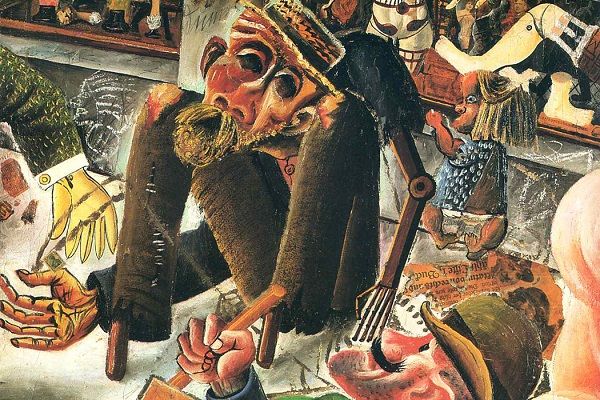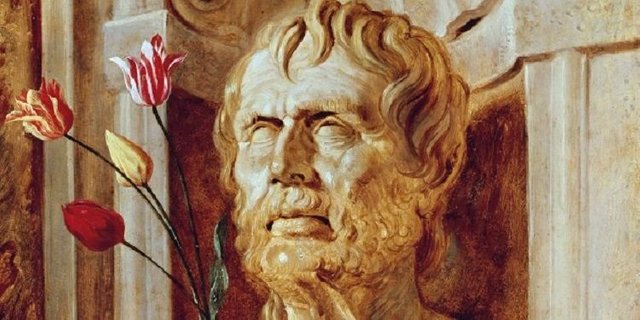Man and the modern philosophy
As in the past, even today, "Man is the only, universal and supreme subject of philosophy!" (L. Feuerbach). The man with his activity, doubts and supposition, with his attitude towards the world, the nature, the material and the non-material, to the others around him, the man with his everyday realization - objectification. In the most general philosophical plan, every existence is already realized because the existing one is in the composition of being and is therefore presently present. Even though the Greek philosopher Plato penetrates the field of objectivation, it remains a fundamental problem for the philosophy of man (homonthology) both theoretically and concretely - practical, because it refers to the objectification of the individual and of the human in the immediate given.

Human fulfillment depends on a number of factors such as social and existential activity, communication, freedom and inviolability, and others. Their limitation leads to one human activity that can not be related to objectification. More Kant's philosophy is hesitant about the complete process of realizing the individual. According to Kant, a man has a border (Grenzbegriff) that can not be crossed. He excludes the transcendence of man's cognitive abilities, the "jump in the hereafter", for example through his devastating critique of "ontological evidence" of God's being, "deter" the human invasion of Absolutely Unknown. Immanuel Kant lived in the 18th - 19th centuries (April 22, 1724 - February 12, 1804), times quite different from modern ones. In the 21st century, full human fulfillment is limited by a number of factors and causes. In the days of globalism, economic imperialism, mass media, and materialism, one can see a "human activism without naturalism" in man. Man merges with the masses, losing himself individually - his unique moral resistance. This human activity can again be defined to some extent as a kind of objectification, such as "human activism," but it is devoid of the "common sense" of philosophical materialism and naturalism, regardless of the realities of being, natural order and - hence - without the presence of the actual active person as a material and spiritual being.
Today, the consciousness of the masses has no proud gusts toward lofty and "transcendent worlds," or an internally-cherished cult of Absolute Knowledge. His "objectification" is filled with very different realities. The serious thought-rich genres of art and science are deeply strange and strange. The only thing that can be understood in the art is the supercoiled and the biologically-sexually orientated. As far as science is concerned, they are interested only in their practical and beneficial production, which make life easier and more enjoyable. The attitude towards Religion and Faith, for which the sophisticated spiritualists were burning in the fanatics of fanaticism, is at a domestic and distinctly individual level. We observe a real elementalization of human existence, an attenuation that is simplified and often "forgiven".

The very process of socializing society leads to a predestined social activity. The paradox is that in order to become a person, one has to socialize because otherwise it remains at the sub-human (animal) level. But socialization as the realization of man has a too high price! In the process of socialization, the human person totally loses his freedom! Once born, human development is determined by the nature of the impacts of the family environment. And although not all of this impact is violent, it still affects the fragile child's psyche, subordinates it to certain rules and patterns of behavior, teaches it to observe the will of the whole, the family, the traditionally established tradition. Furthermore, social determination continues through educational and training processes, where the adoption of past generational norms not only fits into any modern learning system but is also sanctioned by a N-valual evaluation system. This leads to the paradox that the most conformist model of behavior and learning of the given models is valued higher than their subjective criticism or rejection or rejection by the student. Violence of objectification as socialization continues with the entry of man into the field of work and professional realization, in which corporate norms and models are firmly established and locked in pedantically elaborated regulations, subordinated to legal normative acts (laws). There, everything is in an optional spiritual and moral state and in a compulsory alienation - objectification, such as obedience to the necessity, the loss of freedom and the eviction of slavery. In human realization in the society, creativity is also predominantly involved in objectivation. The new that it carries with it when it is not an imitation of creativity is a result of the imaginary and imaginative combination of the subjective and the objective, of what the artist sees and wants to be seen by the "others". Certainly, there is "custom made", which is handed over to the artist-maker with the power of his infinite imagination to create values and patterns for generations. Creativity also gives some insight into Man not only in his modern world, but also in his human objectification for the future. Creativity, such as lenticularization and human realization, is not timeless. Every creative act is timing, involvement in the process of time flow.
Human existential activity is also manifested in the modern philosophy of the 21st century. Socializing society as well as the creativity and demand for innovation and innovation, as the eternal "companions" of the individual over the centuries, as well as the human everyday position in society (the imitation of a "posture" or a civic position combining words and deeds). Imitation activity hidden behind the posture is often identified with civic activism, with vital activity, ie quantitative activity parameters. But in most cases, action can be called imitation - mental and socially inefficient abstention. The social "posture" is only a "transformed" and a tortuous form of vital activism and for this reason - its imitation. It can not be denied that the preconceived "comprehensive" substitution of natural democratic activity with the bureaucratic - formal posture of pseudoactivity acts as a deadening effect on human activity and human activity. As a result, human quests and questions are suppressed, thinned and interrupted, the "human factor" ceases to be a factor.
Thought this was a bunch of bananas at first ^_^
Haha i have not seen that :D
if you have time to see. please help me to grow in steemit .. I would appreciate😀
okey I will :)
Deep my friend. I was in a conversation the other day about man's motivations and if there is actually original thought. It is challenging because we the thinker must think these thoughts which come from inside of us perhaps. Jung talked about the collective unconsciousness that impacts what we think and our ability to truly be original. Others have had similar thoughts or wider variations. In the end though if you look at history we keep repeating. So is there truly original thought? Give me some of your thoughts please?
yeah history repeats itself..
@thaicryptokitty, this is a matter that has really worried me for a long time, and I keep asking for that all the time. I myself make music, write stories, scripts for movies or plays. Everything I think I immediately see where his roots are in the past. Interestingly, sometimes when I think something I create is really original, then a person comes and tells me that I have been inspired by a certain people that I don't have heard before. For example there are many people who write expressive works, but they also have never heard for the expressionism. I'm still struggling with this, and I don't want it to be true - that everything is fictitious, and something new can be created, but my experience so far speaks the exact opposite.
Yes this is the dilemma of the creative person. But there are things you can point to that do not have obvious foundations. A few that come to mind include: Some Egyptian architecture, some works of DaVinci (his drawings), Tesla of course, and musicians including Beethoven and there are many more out there. These are questions that will not get answers in ur lifetimes but thinking through them is fun and interesting.
I think modern is classic and classic is modern.
Well, all philosophical systems that were thought in ancient Greece, the modern philosophy is now repeating and inventing them in different variations. :)
it's just reincarnation, there nothing new under the same sunshine. change only slightly, only on geography, climate and culture :)
when I can be like @godflesh yes, it's really amazing.
:)
humankind era attitude generous .. not like today's people do not care about each other.Man and the modern philosophy the best epic photo
Mr.@godflesh
This post has received gratitude of 13.72 % from @appreciator thanks to: @godflesh.
Thank you :)
Wonderful write up, thanks for sharing
I like what you write, certainly no one is totally free, but to master the desires of each one is also an art, for example the monk of monthe Athos achieve perfection or wisdom by being very strict with themselves, striving hard.
great information. thanks for sharing this brother :)
You are welcome :)
Damn, that's deep like an ocean. Mariana Trench deep ☺️
I'll have to read it 5 times to make sense of it all.